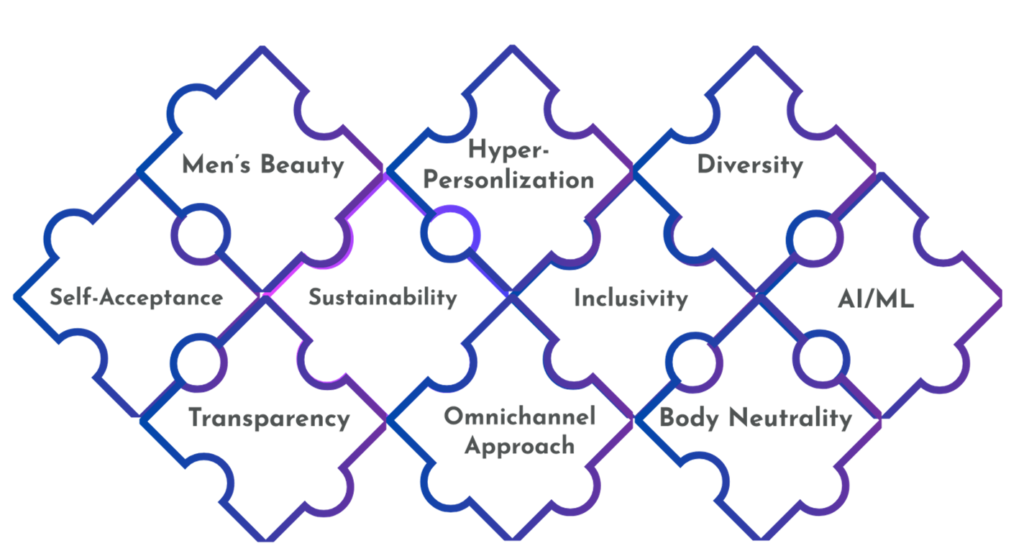As the infatuation with chemical-based products goes down and sustainability takes charge, the personal and skincare industry is compelled to take a bow and revise its intent, approach, and product lines. Be it regulatory or consumer perception, the focus is on getting back to nature. So, assuming that major developments and trends this year would be in this direction wouldn’t be a stretch. On a broad scale, it is a multi-channel shift that would include technological, economic, regulatory, and several other disruptions. To simplify, we have divided the outlook into five major categories:
Sustainability:
Consumers and regulators have registered a growing skepticism against corporate commitment to sustainability. As governments move in to gain higher control and insight into product safety and sustainability, companies are restrategizing their approach to new and existing product lines. For instance, MoCRA in the US extends the FDA’s indulgence in innovation promotion, consumer trust, and transparency in product manufacturing. The push goes horizontally across the value chain. Here, environmentally friendly requisite tags from sources to suppliers, production, packaging, and final disposal. Investments in certifications saving from greenwashing are expected to ascend in 2024 and thereafter.
Personalization:
AI, ML, and mixed reality are changing the nature of offerings and end-user expectations. Personalization is one of the biggest trends that is reshaping the industry. The era of hyper-personalization is finally upon us, where products will be tailored to individuals’ preferences and needs. New terms like virtual-try-ons, personalized beauty routines, etc., will be the new beauty and personal care domain hashtags. However, transparency of data sources will be the key to retaining consumer’s trust.

Figure: Major Personal and Skincare Trends In 2024
Personal And Skincare Industry: Inclusivity
As the medical industry addresses the issue of medical biases, the personal and skin care domain is also dealing with the long-time elephant in the room – including all skin types, genders, and different sexual identities in their product profile. More and more consumers are calling out brands to promote inclusivity and overcome the long dragged racial bias. When quantified, black brand revenues account for just one-fourth of the total spending by black consumers. Though there is a spike in companies promoting makeup and skincare products specifically for black and dark-skinned individuals, there is still scope for more efforts and initiatives.
Personal And Skincare Industry: AI Empowering
AI is permeating every facet of the personal and skin care industry, ranging from personal recommendations to virtual beauty assistants, personalization, efficiency, product planning, or go-to-market strategies. Companies are leveraging AI-based algorithms to analyze individual concerns, priorities, medical history, skin, scalp, and hair. It answers questionnaires, uploaded information, etc., to provide personal recommendations, insights, nutritional plans, personal care routines, ingredients, and so on. Similarly, AI-based chatbots and apps offer emotional support, discuss concerns, and prevent unnecessary purchases of ineffective self-care services or products. This domain’s scope, opportunities, and range of services are expected to reach the next level this year.
Body Neutrality:
Though it has been discussed for some time, body neutrality is finally garnering the attention it needs. As self-acceptance grows among the target masses of the self-and personal care industry, it will modify the basic approach to product planning and projection. Further development can be expected this year, both on the consumer and manufacturer’s ends.
Personal And Skincare Industry: Omnichannel Approach
The need to connect, monitor, and understand end-users’ patterns and preferences is driving the personal care industry to adopt an omnichannel approach. In addition to social media, efforts are also being made to use e-commerce platforms for this purpose. Here, sales, feedback, purchase history, online behavior, and targeted suggestions can be carried out in one place. The biggest leverage of this approach will be in customer segmentation (geographic, demographic, etc) and customization of products and marketing efforts accordingly.
Increasing Synchronicity Between Beauty, Personal Care, And Wellness:
With rising awareness about holistic beauty, the alignment between personal care, skin care, and the health & wellness industry is growing exponentially. The question of looking good has moved beyond the skin, and as its parameters extend to emotional, immunity, and nutritional aspects, the inclination towards supplements, health boosters, and mental well-being takes charge. Hence, brands promoting aesthetic and personal care options will need to look into wellness from now on.
Conclusion
Personal and self-care deeply impact societal and technological developments, which is one of the first. The biggest push this time comes from consumers who want to go authentic, organic, and real without compromising the planet’s safety. The drive to understand the purchase, its active ingredients, long-term effects, sustainability, etc., is taking their approach beyond traditional marketing norms. So, transparency and a natural ingredient-based approach become imperative for the makers. It is a multi-faceted predicament that the industry needs to address to appease users, regulators, and profit margins. The changes triggered by these disruptions will, for sure, transform this industry to the next level.
What’s More?
Check out the major trends that are changing the landscape of the personal and skincare industry and will play a key role in its growth in the near future.